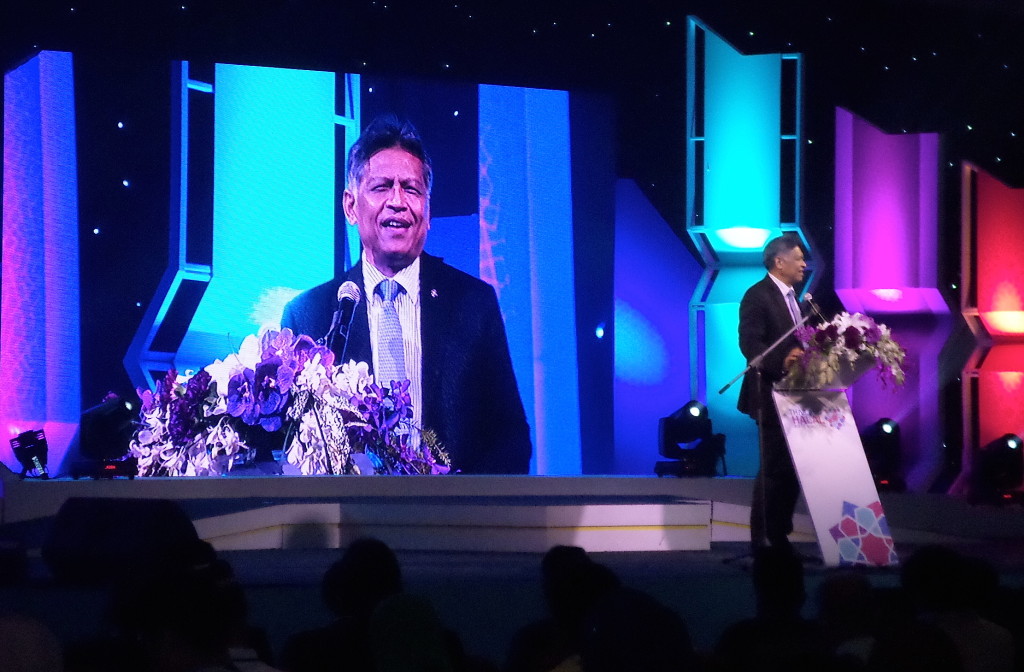
28 Dec, 2015
Ex-ASEAN chief Surin Pitsuwan calls for “New Beginning” in Islamic world
Bangkok – Thailand’s best-known Muslim personality Dr Surin Pitsuwan has called on the global Islamic community to use the growing number of halal events to think well beyond food, products and services and chart a “new beginning” with a focus on solving many of the world’s looming problems.
Addressing the closing ceremony of the annual Thailand Halal Assembly on Dec 27, the former Thai Foreign Minister and ASEAN Secretary-General called on Muslims to prove wrong the many Western scholars who were referring to Islam in the “past tense” and revive the historic scientific contributions of Islamic inventors, mathematicians such as Ibn Sina, Ibn Rushd, Ibn Khaldun and Al Farabi.

Dr Surin Pitsuwan addressing the closing ceremony of the Thailand Halal Assembly
The closing ceremony was attended by dozens of Bangkok-based diplomats, officials of the Organisation of Islamic Cooperation countries and leading members of the Thai-Muslim community who attended the Thailand Halal Assembly.
The three-day event, comprising of a scientific conference, business workshops and a trade show, is organised by The Halal Science Center (HSC) of Chulalongkorn University, Central Islamic Council of Thailand, Halal Standard Institute of Thailand, and Halal Development Council, with the support of the Dubai-based Gulf Halal Centre.
In just two years, it has become effectively the annual convention of the Thai-Muslim community, and plays an important role in facilitating their contacts with the ASEAN and Islamic countries, as well as the huge Muslim diaspora worldwide. The event contributes significantly to the success of the Thai tourism strategy to better position Thailand as a Muslim-friendly destination.
In his speech, Dr Surin, a Harvard-educated former politician, noted that the projected global population of 10 billion people by 2050 will present common problems that will require shared solutions, and the Islamic world can contribute positively to them.
Noting that the Muslim world “has been under tremendous scrutiny, suspicion and microscopic examination over the last few years,” he said this has led to much thought about how it should respond.
As Islamic events such as the Thailand Halal Assembly were being successfully held worldwide, “we have to use this platform to think beyond just halal, something far larger than halal. We should be thinking about Al Hayat al Tayyabah (Arabic for a ‘Good Way of Life’, stemming from a comprehensive, holistic system of social, economic, environmental and political justice).”
Dr Surin, who also studied at the Islamic world’s prestigious Cairo-based Al Azhar University, cited the historic contributions of great Islamic inventors, astronomers, mathematicians such as Ibn Sina (Avicena in Latin), a medical scientist, Ibn Rushd (Averroes in Latin), a jurist-cum-philosopher-cum-medical doctor, Ibn Khaldun, a philosopher of history, and Al-Farabi, a translator and Commentator of Plato’s and Aristotle’s works.
Above that, Dr Surin noted, Muslims had the guidance of the Qur’an, the Hadith. Together, he said, these offered a clear path forward to deal with the emerging global challenges.
“In just 35 years, there will be another 2.5 billion on this planet, to add to the 7.5 billion today. What will happen when 10 billion people are on this planet, if we don’t come together? If we don’t come together to create a new kind of lifestyle – one that will share, contribute to Al Hayat al Tayyabah?”
He noted that global leaders had agreed on a future agenda known as the UN Sustainable Development Goals, a core principle of which is that “there must be justice, fairness in the sharing of the fruits of the development of this world.”
As halal events were helping to convene some of the best minds in the Muslim world, “let us use this platform to go beyond talking about halal food and nutrition, and be creative, innovative and contribute to the future of this planet. Let us think as creatively as we used to do in the past.”
Dr Surin rued the claims by several Western scholars who are talking about the Islam of the past. “We have to change that tense,” he said. “We have to bring it back, show an Islam that is progressive, an Islam that is lived, that Islam that is an inspiration.”
He said the “development” agenda in the Western world had led to industrialization “which came back to us in the form of colonialism. And that is where everything went wrong.
“Now, here is a new beginning. If we want to give good nutrition, healthy food to humanity, we must also think about how to come with a good way of life for the future. We have bring the DNA of our ancestors and put it to work in our schools, pondoks, universities and research institutions. That’s what we have to do. All of us. It is our collective responsibility. We have to think more broadly and more deeply. Let halal be the starting point. Not as a cause of the conflict but a resolution to the conflict we are all involved in now.”
He said Thai Muslims comprised only a small percentage of the total Thai population can also “make that contribution to civilisation just like our ancestors did.”
He added, “We have all the resources. We have the rationality, the wisdom that we can use to help all of humanity. We have to make sure that our diversity is not the cause for conflict but a reason for celebration.
“So I hope this is only the first step, the start of our long journey into the future. I hope that the next 12 months towards the next Thailand Halal Assembly, we can think about how to contribute to that Al Hayat Al Tayyabah not just for ourselves but for all humanity.”



Liked this article? Share it!